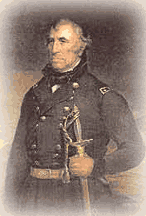Zachary Taylor, son of a Revolutionary War veteran, was born near Barboursville, Virginia. His father received a land grant in Kentucky for his military service and moved the family to a new home in the West. Young Taylor received little formal classroom schooling, but it was supplemented by tutors.  In 1808, with the help of family friend James Madison, Taylor was commissioned a lieutenant in the U.S. Army; two years later he achieved the rank of captain. During the War of 1812 he served with distinction in the defense of Fort Harrison against Tecumseh's forces in the Indiana Territory.
Taylor left the service, but returned in the 1820s, a period of relative peace. That tranquility was eventually ended by the Black Hawk War (1832) during which Taylor served in Wisconsin. In his 1837-38 campaign against the Seminole, Taylor earned the nickname “Old Rough and Ready” from admiring soldiers.
In 1841, Taylor became commander of the Second Division of the U.S. Army and was stationed in Fort Smith, Arkansas.
The Mexican War (1846-48) transformed Taylor from a minor military figure into a presidential contender. He was dispatched to the disputed Texas border and won twin victories at Palo Alto and Resaca de la Palma in May 1846, several days before war was declared by Congress. Following the declaration, he invaded Mexico and took Matamoras and Monterrey.
Taylor, however, became the object of criticism because of his alleged failure to press on following his initial success. Many later historians recognized that his caution was rooted in his lack of supplies, trained recruits and dependable transportation.
President Polk, unhappy with the stalled progress, diverted a portion of Taylor’s army to Winfield Scott, who was assigned the task of taking Mexico City. Despite his reduced force, Taylor defeated General Antonio López de Santa Anna at the Battle of Buena Vista in February 1847, and immediately became a national hero.
Taylor received the Whig nomination for president and defeated a badly split opposition in the Election of 1848. During his brief time in office, he succeeded in foreign affairs by negotiating the Clayton-Bulwer Treaty with Britain. Taylor also supported the Wilmot Proviso and refused to support the pending Compromise of 1850.
Taylor died in July 1850 after only 16 months in office. His life and career were marked by contradictions and ironies. He experienced mixed success as a military commander, but was regarded as a great military hero. He was a slave owner, but stoutly supported the annexation of California and New Mexico as free states. He was a firm supporter of the Union and threatened to lead the army personally if secession occurred, but his daughter was married to Jefferson Davis and his son would serve as an officer in the Confederate Army.
In 1808, with the help of family friend James Madison, Taylor was commissioned a lieutenant in the U.S. Army; two years later he achieved the rank of captain. During the War of 1812 he served with distinction in the defense of Fort Harrison against Tecumseh's forces in the Indiana Territory.
Taylor left the service, but returned in the 1820s, a period of relative peace. That tranquility was eventually ended by the Black Hawk War (1832) during which Taylor served in Wisconsin. In his 1837-38 campaign against the Seminole, Taylor earned the nickname “Old Rough and Ready” from admiring soldiers.
In 1841, Taylor became commander of the Second Division of the U.S. Army and was stationed in Fort Smith, Arkansas.
The Mexican War (1846-48) transformed Taylor from a minor military figure into a presidential contender. He was dispatched to the disputed Texas border and won twin victories at Palo Alto and Resaca de la Palma in May 1846, several days before war was declared by Congress. Following the declaration, he invaded Mexico and took Matamoras and Monterrey.
Taylor, however, became the object of criticism because of his alleged failure to press on following his initial success. Many later historians recognized that his caution was rooted in his lack of supplies, trained recruits and dependable transportation.
President Polk, unhappy with the stalled progress, diverted a portion of Taylor’s army to Winfield Scott, who was assigned the task of taking Mexico City. Despite his reduced force, Taylor defeated General Antonio López de Santa Anna at the Battle of Buena Vista in February 1847, and immediately became a national hero.
Taylor received the Whig nomination for president and defeated a badly split opposition in the Election of 1848. During his brief time in office, he succeeded in foreign affairs by negotiating the Clayton-Bulwer Treaty with Britain. Taylor also supported the Wilmot Proviso and refused to support the pending Compromise of 1850.
Taylor died in July 1850 after only 16 months in office. His life and career were marked by contradictions and ironies. He experienced mixed success as a military commander, but was regarded as a great military hero. He was a slave owner, but stoutly supported the annexation of California and New Mexico as free states. He was a firm supporter of the Union and threatened to lead the army personally if secession occurred, but his daughter was married to Jefferson Davis and his son would serve as an officer in the Confederate Army.